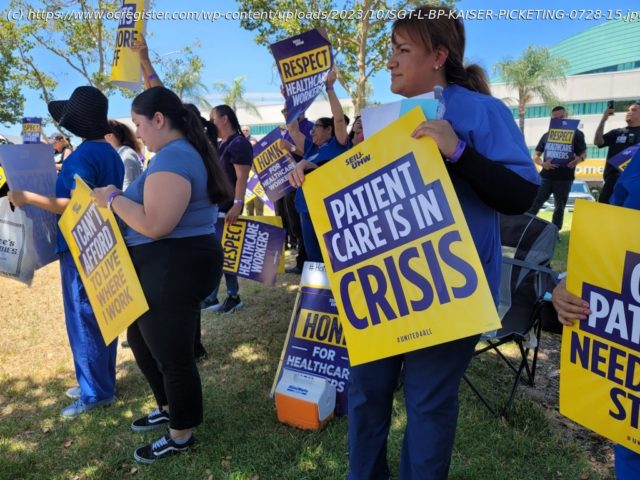Both sides cited progress in negotiations but not enough to call off the planned walkout.
Kaiser Permanente is warning patients of potential disruptions to medical care ahead of a massive three-day strike planned to start Wednesday morning if a new contract deal can’t be reached with its workforce.
A coalition of unions is planning picket lines for 6 a.m. outside dozens of California medical centers, including Kaiser’s major facilities in Los Angeles and Orange counties, in a bid to obtain higher wages and more job protections. Thousands of local workers are ready to stop work.
The labor action by 75,000 Kaiser workers across the country comes amid a surge in strikes in the U.S. A months-long strike by Hollywood writers ended late last month after a deal between their union and movie and TV producers. Film and TV actors remain on strike against Hollywood studios. In mid-September, thousands of unionized auto workers went on strike over wages at General Motors, Ford and Chrysler-owned Stellantis. Southern California hotel workers have been striking on and off since early July.
Meanwhile, Gov. Gavin Newsom on Saturday vetoed a bill that would give unemployment benefits to striking workers in California.
Kaiser and a coalition of unions representing the workers — including lab and X-ray workers and some nurses — both cited progress in negotiations over the weekend, but not enough to call off the planned walkout. On Monday morning, both sides agreed to continue to meet through mid-day Tuesday if necessary, Kaiser said.
The healthcare giant serves 9.4 million patients in California. Here’s what Kaiser members need to know:
Q: Will all Kaiser facilities shut if there’s a strike?
A: Kaiser said it would keep all hospitals and emergency departments open. “Our facilities will continue to be staffed by our physicians, trained and experienced managers, and staff,” Kaiser said, adding that it could bring on “professionals contracted to serve in critical care roles specifically for the duration of a strike.






